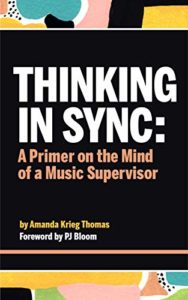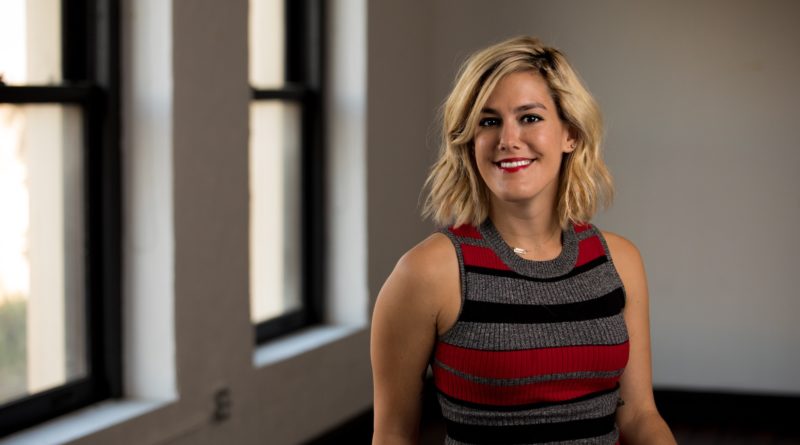Amanda Krieg Thomas Helps You Get In Sync With Music Supervisors, Part II
We’re back with Part II of our conversation with Amanda Krieg Thomas, leading music supervisor and author of Thinking In Sync: A Primer on the Mind of A Music Supervisor.
In Part I of this series, Thomas shared the realities of how a music supervisor works, helping to dispel some of the mysteries and misconceptions. Plus she shared some of the practical advice you can expect in her book.
In this installment, Thomas dives in a bit more on the career of music supervision, plus reviews her tips on how to submit music to supervisors and more helpful hints for those hoping to achieve success in sync.
The Wisdom of Mentors
In a role where on-the-job experience is still the best way to build your career, it’s no surprise that Thomas credits her mentors as pivotal to her development.
Veteran music supervisor P.J. Bloom, who penned the forward to Thomas’ book, served as Thomas’ manager and key collaborator during her time at Neophonic, until he departed for a role as Senior Vice President, Film & Television Music and Soundtracks at Warner Brothers.

“I learned so much from P.J. That is a huge mentor relationship for me,’ says Thomas, who worked with Bloom for 2 years. “He was very instrumental in helping me learn to ask the right questions first, that I don’t need to know every single detail before I answer, and that you don’t need to say ‘yes’ all the time right away, all of which were good lessons for me.”
Critically, Bloom also was instrumental in getting Thomas to understand her own talents and value in an industry that can be tough.
“PJ would tell me ‘Own the things you know. You know more than you think you do and you should trust that,” recalls Thomas. “Those were really important things to hear.”
This is something Thomas reflects on a lot as she embarks on a new journey as the principal of her own independent music supervision company, Yay Team Productions. With the arrival of her first child in June, another mentor who is top of mind for Thomas is the legendary Julia Michels, of Format Entertainment, whose credits include mega-hits like A Star Is Born and the Pitch Perfect films.
Crediting Michels as a fantastic teacher when Thomas was early in her career, she is also mindful of the powerful role model she was privileged to experience in her time working with the award-winning music supervisor.
“It was a close-up look at the life of an independent music supervisor – a bad-ass woman balancing a career and a family and a marriage,” recalls Thomas. “Challenging at times, but incredibly rewarding. It was an important thing to see, as a woman in the industry. It was as – if not more – important than learning how to craft a music brief email or search the ASCAP website.”
So, You Want To Be A Music Supervisor…
Think this might be the career for you? While there are a growing number of classes in music supervision at some reputable colleges and universities (mostly in Los Angeles, and taught by some experienced and reputable music supervisors), those are still few and far between.
Your best bet is to enter the industry at the bottom and work your way up, learning from an experienced music supervisor – just like Thomas did. Roles as interns and music coordinators pop up occasionally. Follow your favorite supervisors on Twitter and Instagram to stay in the loop.
In the meantime, Thomas has some wisdom to share on the skills and traits that are going to be useful in a career as a music supervisor.
“Even though they’re very different jobs, I really feel like my experience as a theater stage manager prepared me for music supervision,” shares Thomas, who recalls her days juggling the myriad little moving parts involved in a stage production.
“In theater a stage manager is tracking all the props, costumes, schedules, blocking. The same is true in music supervision,” says Thomas. “There are clearances, on-camera performances… Do the music editor, the editor, the on-set production people all have what they need? You’re constantly making sure there are no details lost in any of those processes.”
Not surprisingly, Thomas also highlights the interpersonal side of both roles.
“Similarly, you are a right-hand person to the director,” Thomas points out. “In college as a stage manager, I’ll never forget, my professor once told me, ‘The director is not sure that she is confident in you because you seem a little all over the place.’”
This was a wake up call to Thomas, and still informs how she works with her clients today. The very Type A Thomas was certainly on top of everything, but needed to think about how her director worked, and how they preferred to receive information.
“To be able to read this other person and their goals is critical in supervision,” says Thomas. “I like to start off by figuring out what their needs and expectations are and saying, ‘Okay, cool. That person is my leader and I’m going to tailor my approach to that person.’”
If those scenarios sound painful and these skills aren’t in your toolkit, this might not be the career for you.
A Decade In the Business
While a lot of things have changed over Thomas’ decade in music supervision (the rise of Spotify and Netflix being just two examples), perhaps the biggest shift is the growing attention on music supervision itself.

“I do think that visibility is a big thing that’s changed, but the danger with that is that it means the misconceptions are just ever more rampant,” shares Thomas.
While there is now an Emmy award for Music Supervision and music supervisors are eligible for the soundtrack compilation Grammy, these victories were hard-fought. And the nominations for the Emmys have muddied the waters around the role of a music supervisor even further, as have some press articles, which often fixate only on song selection.
Thomas is frustrated by this, acutely aware of both the collaborative nature of her job and the day-to-day nuts and bolts of being a music supervisor.
“There are a lot of publications who will write, ‘The soundtrack of the show is great. Selections picked by music supervisor X,’ but I never want to claim credit in that way,” laments Thomas. “Ryan [Murphy] has amazing taste in music; Alexis [Martin Woodall, executive producer on all of Murphy’s shows and President of Ryan Murphy Productions] has amazing taste in music. They are the true forces behind the selections on those shows. And a beautiful component on Pose especially is that [creator] Steven Canals, [producer/director] Janet Mock and [writer/producer] Our Lady J all contribute song selections as well – which is what helps that world feel so authentic. As a music supervisor it’s my job to make their vision a reality – whatever it takes.”
To Send Music, or Not To Send Music?
For those of you looking for more tips on getting your music placed in films or television, don’t worry, we’ve got some more of Thomas’ tips for you, too. First up, the eternal question about whether or not to send a supervisor music.
Once you’ve done your research and crafted your strong intro email (see tips from Thomas in Part I of our interview), do go ahead and be sure to include some links to songs you think are relevant to a supervisor’s project (or projects).
“Don’t ask me for permission to submit – that’s another email that I don’t have time to respond to,” says Thomas. “I like being sent the music because even if I don’t get around to listening to it for a long time, it’s there, filed in my inbox. No more than 10 songs, though.”
Each supervisor has their preferences and different systems for organizing music, but links to stream are generally preferred. Best practice is to also including a (non-expiring) link to download the track (with full metadata!) if they like what they hear.
The research piece can be hard, Thomas admits. Supervisor credits may not be posted on IMDb yet, or production schedules might fall well in advance of when a show airs. Never mind completely new shows where the sonic profile may not be evident to those not directly involved in production.
That means it’s time for a “Best Of” sampler that highlights your strengths. Thomas describes this as: “How would you sell your company or your roster or artist in six to 10 songs?”
Here, narrowing in on your specialty is really your best bet to make a strong impression.
“Everybody wants to be like, ‘I’ve got it all! Come to me for any search,’” says Thomas. “But I would rather you tell me the four to five things you’re really strong in. Or even fewer, because that will stick in my brain. Be specific about what you’re really good at and include those keywords in your email.”
Thomas never knows when she’s going to need a particular niche type of music for a specific scene. If your email is there at her searching fingertips, you’ve got a shot.
After you’ve clicked send, try to be patient. Frequent follow ups aren’t going to help, and may actually hurt. For the supervisors who don’t accept unsolicited music, your email has already been filed in the trash. (Sorry, but it’s true.) For the ones who do, like Thomas, it’s been filed for future reference.
“I have a folder of new people who have submitted stuff to me and I might have a search for world music. I’ll put in ‘world’ or ‘Latin.’ Or maybe I’m looking for something unusual, like throat singing,” shares Thomas. “If you’ve got songs similar to a well-known artist, like Katy Perry, then an artist reference is helpful.”
One critically important tip: All of this info you share has to be something she can search in the text of an email.
“Some people put together these mailings with beautiful graphics, but you can’t search the words on those images! That drives me crazy,” says Thomas.
Patience Is A Virtue, and Required
Still waiting? We’ve got tough news for you. Sync success can take time. A lot of time. And it doesn’t always turn into a Snow Patrol Cinderella story, where an artist gets launched into mainstream chart success.

The reality is that the typical trajectory is much more modest. First, an artist has to make it onto a music supervisor’s radar, then the right search has to come up that fits that sound, then the song has to actually be selected, among all the other possible choices.
And then, of course, that placement has to make an impact on fans. Not every music cue stands out. They can’t all be that big end montage or closing credits. Though there are still lots of people on Tunefind each month tracking down the songs they’ve heard faintly playing in the background of that bar scene, too.
“There are just so many moving parts involved,” cautions Thomas. “Jonathan Leahy moderated a panel I was on at the Guild of Music Supervisors Conference last year and he said, ‘Every sync is a snowflake.’ I love that – it is so true.”
As an artist, there are a few things you can do to make sure you’re positioned for success throughout the process.
“If you hire a pitching company or somebody to be on your team to pitch your music – which everyone should do – you just have to be patient, be present, be engaged in the process, even if it takes a long time,” says Thomas.
“How you can be helpful is have your instrumentals ready, have your WAVs ready. Make life easier for that person who is working your music,” advises Thomas. “But also know that even if you’re super available and super enthusiastic, it’s still going to take time, and it’s just really unpredictable.”
Finally got a sync placement? Congratulations! But you’re not done yet. Tunefind has some tips for how you can make the most of your moment in the sync spotlight.
The Network of Trust
Many music supervisors strongly recommend that artists work with sync industry professionals to represent them for sync. Not only do these companies and individuals have existing relationships with music supervisors, but they also know the business side cold. Their expertise can be invaluable in helping an artist navigate the sync licensing world, and make the relationship smooth for the music supervisor.
But there are a lot of companies out there who claim to offer this service. It can be hard to tell which ones are legit. Thomas cautions artists against any company who tries to take a cut of their publishing and anyone who asks for money in order to pitch their music.
“Think of that person as another member of your team. If you don’t feel comfortable with that person – if you don’t feel like they’ve got your best interests at heart – then don’t sign,” Thomas advises.
To find those reputable companies, do some detective work to figure out who reps which artists, and where their music has been placed.
“It is very much a network of trust,” points out Thomas. “If you go to a company’s website and they have legitimate scripted shows and big movies on their recent placements list, that’s a good sign.”
Conference websites are one of her hot research tips, as well. Even if you can’t attend, trolling through speaker bios can point you toward major players and reputable companies that are within that network of trust.
One other word of caution from Thomas: be wary of nonexclusive deals.
“I get why artists want non-exclusives, and again, if you feel like you are talking to companies that you trust and people who have your best interests at heart, then that’s one thing,” says Thomas. “But some artists will sign dozens of non-exclusive agreements, and then none of those companies are truly incentivized to make anything happen for you. Plus, if we see your name pitched as ‘one stop’ from three or four different companies, how do we know who to go to if we want to use one of your songs?”
A Final Word…
We hope Part I and Part II of this interview with Amanda Krieg Thomas has given you valuable insight into the world of music supervision, but this just scratches the surface. For more, be sure to check out Thinking In Sync: A Primer on the Mind of A Music Supervisor.
More
〉Amanda Krieg Thomas Helps You Get In Sync With Music Supervisors, Part 1
〉Read now: Thinking In Sync: A Primer on the Mind of A Music Supervisor
〉Amanda Krieg Thomas on Tunefind
〉Thomas’ company: Yay Team Productions






Pingback:Top TV Song Last Week: Out of Control by Oshins, feat. Rosi Golan - Tunefind